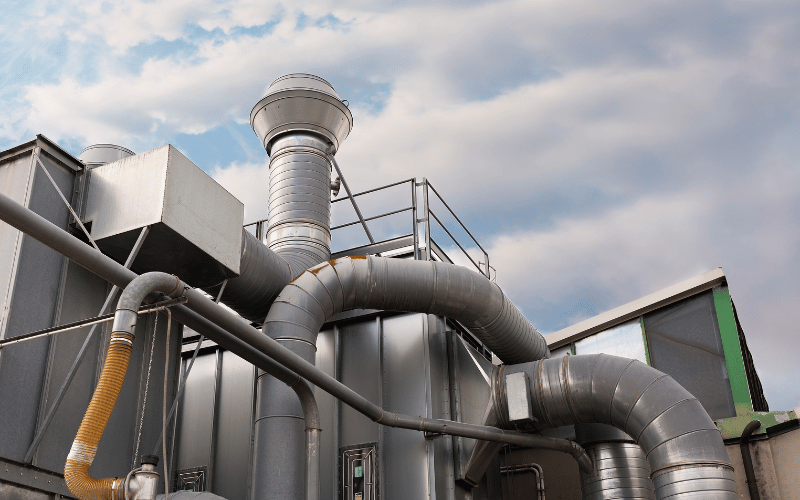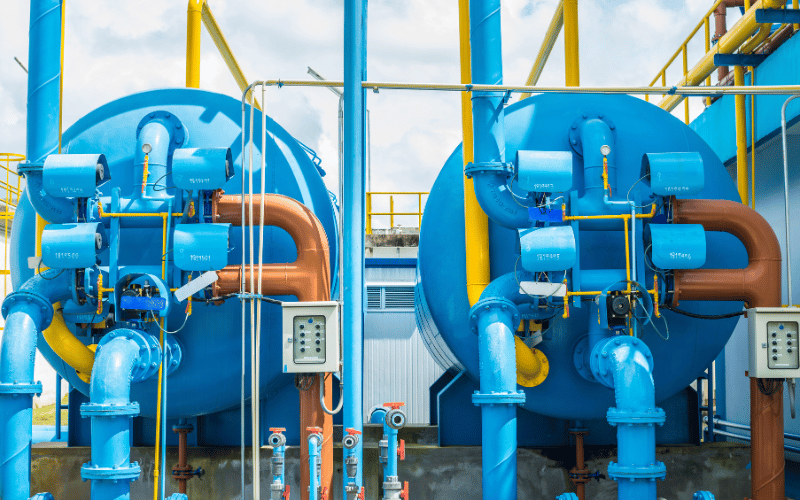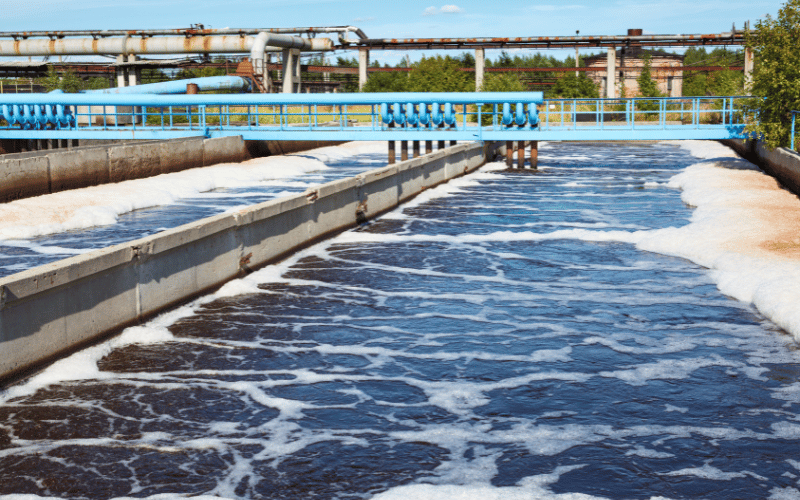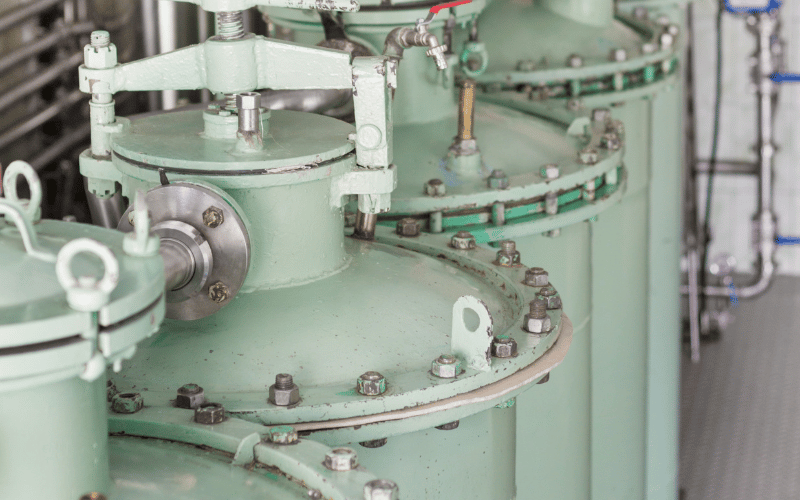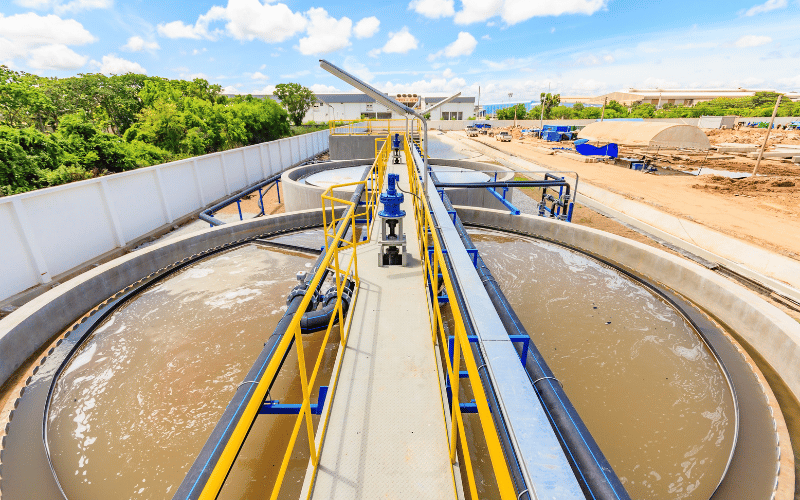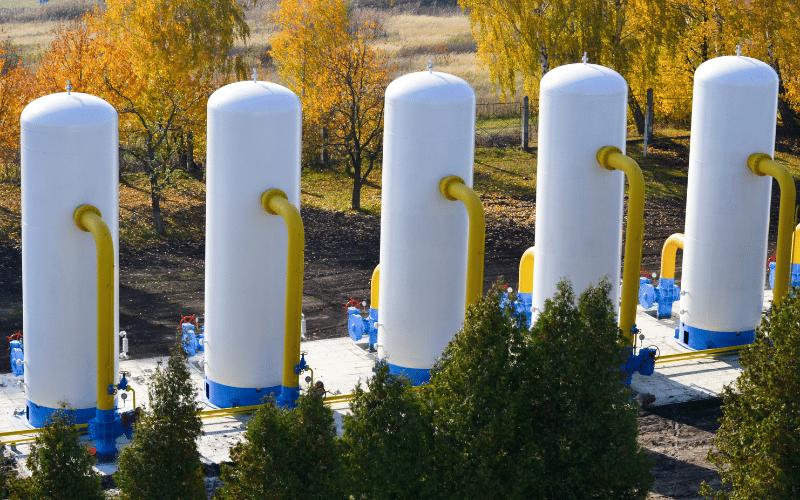Industrial filtration is the backbone of countless industries, ensuring the purity, safety, and efficiency of processes that drive modern business. From removing contaminants in water treatment plants to maintaining sterility in pharmaceutical production, filtration systems play a critical role in protecting equipment, improving product quality, and meeting regulatory standards. As industries evolve, advancements in filtration technologies and materials are paving the way for smarter, more sustainable solutions that address the growing demands of today’s complex operations.
Table of Contents
ToggleWhat is Industrial Filtration?
Industrial filtration is a vital process used across a wide range of industries to ensure the purity, safety, and quality of liquids or gases. It involves removing unwanted particles, contaminants, or impurities from a fluid stream, allowing only the desired components to pass through. This process is critical in industries like pharmaceuticals, food and beverage, automotive, and water treatment, where even minor contamination can lead to significant issues.
Filtration works by using a physical barrier, such as a screen, mesh, or membrane, to separate solids from liquids or gases. The barrier traps unwanted particles while allowing the desired substance to flow through. For example, in water treatment plants, filters remove sediment, bacteria, and other impurities to produce clean drinking water. Similarly, in the food industry, filters ensure that beverages like beer or juice are free from unwanted particles, maintaining clarity and taste. Industrial filtration systems operate on the same principle as a coffee filter, but are designed to handle much larger volumes and more complex contaminants.
Types of Filtration Methods
Industrial filtration is a critical process that employs various methods to address specific contaminants and meet the unique needs of different industries. Each method has its own principles, applications, and advantages, making it essential to choose the right one for the task at hand. Below is a detailed overview of the primary filtration methods.
Mechanical Filtration
Mechanical filtration is one of the simplest and most widely used methods. It works by using physical barriers, such as screens, meshes, or filter media, to trap and remove solid particles from liquids or gases. The effectiveness of this method depends on the pore size of the filter material, which determines the size of particles it can capture. Mechanical filtration is commonly used in HVAC systems to trap dust, pollen, and debris, improving air quality in industrial and commercial spaces. It is also a key component in wastewater treatment, where it removes sediment, sludge, and other solid waste before further processing. This method is cost-effective, easy to maintain, and ideal for applications requiring the removal of larger particles.
Adsorption
Adsorption is a filtration method that uses materials like activated carbon or zeolites to attract and trap dissolved chemicals, gases, or odors on their surface. This process is highly effective for removing impurities at a molecular level. Adsorption is widely applied in air purifiers to eliminate volatile organic compounds (VOCs), odors, and harmful gases, ensuring cleaner indoor air. In water treatment, it is used to remove chlorine, organic pollutants, and heavy metals, improving both the taste and safety of drinking water. Additionally, adsorption plays a crucial role in chemical processing, where it captures toxic gases or vapors to meet environmental compliance standards. This method is particularly valued for its ability to enhance the quality and safety of air and water.
Centrifugal Separation
Centrifugal separation relies on the application of spinning force to separate particles based on their density. Heavier particles are forced outward to the edges, while lighter particles remain closer to the center. This method is highly efficient for separating particles of varying densities and is commonly used in industries like dairy processing and oil refining. For example, centrifugal separators are used to separate cream from milk in dairy production, ensuring consistent product quality. In oil refineries, this method removes impurities such as sludge and water from crude oil, improving its quality and usability. Centrifugal separation is ideal for high-volume, continuous processes and reduces the need for disposable filters, making it both efficient and environmentally friendly.
Membrane Filtration
Membrane filtration is an advanced method that uses semi-permeable membranes with precise pore sizes to separate particles, microorganisms, and dissolved substances from liquids. This method is highly versatile and can achieve varying levels of filtration precision, depending on the type of membrane used.
- Microfiltration: This type of membrane filtration removes larger particles, such as sediment, bacteria, and suspended solids. It is commonly used in beverage production to ensure clarity in products like beer and juice. Microfiltration is also a pre-treatment step in water purification systems, where it removes visible impurities before further processing.
- Ultrafiltration: Ultrafiltration targets smaller particles, including viruses, proteins, and fine colloids. It is essential in pharmaceutical manufacturing, where it sterilizes injectable drugs and ensures the purity of solutions. Ultrafiltration is also used in dairy processing to concentrate proteins in milk, enhancing its nutritional value.
- Reverse Osmosis (RO): Reverse osmosis achieves the highest level of filtration precision by removing dissolved salts, minerals, and contaminants at the molecular level. It is indispensable in desalination plants, where it converts seawater into clean drinking water. RO is also critical in semiconductor manufacturing, where ultra-pure water is required for chip production. This method is highly effective for applications demanding the highest levels of purity.
Additional Filtration Methods
Industrial filtration is a critical component of modern operations, ensuring the purity, safety, and efficiency of processes across various industries. While commonly used methods like mechanical, adsorption, centrifugal, and membrane filtration are well-known, several other techniques play equally important roles in addressing specific industrial challenges. These additional filtration methods offer unique advantages and are tailored to meet the demands of specific applications.
Gravity Filtration
Gravity filtration is one of the simplest and most cost-effective filtration methods, relying solely on the natural force of gravity to push liquids through a filter medium. This method is primarily used to remove solid impurities from liquids without requiring external pressure or energy. The fluid flows through a porous filter medium, which traps solid particles while allowing the liquid to pass through. Gravity filtration is widely used in laboratory settings, such as organic chemistry experiments, to separate solid impurities from liquid solutions. It is also employed in small-scale water purification systems to remove sediment and debris. While this method is energy-efficient and straightforward, it is not suitable for high-volume or high-precision industrial processes, as it cannot handle fine particles or high flow rates.
Vacuum Filtration
Vacuum filtration, also known as suction or reduced-pressure filtration, is a more advanced method that uses negative pressure to accelerate the filtration process. A vacuum pump creates a pressure differential, pulling the liquid through the filter medium at a faster rate than gravity filtration. This ensures efficient separation of contaminants, even for fine particles. Vacuum filtration is commonly used in pharmaceutical manufacturing to remove fine particles from liquid formulations, ensuring compliance with stringent purity standards. It is also employed in air purification systems for cleanrooms, where even microscopic particles can compromise product quality. Compared to gravity filtration, vacuum filtration is faster and more precise, making it ideal for high-purity applications. However, it requires specialized equipment and is less cost-effective for low-volume operations.
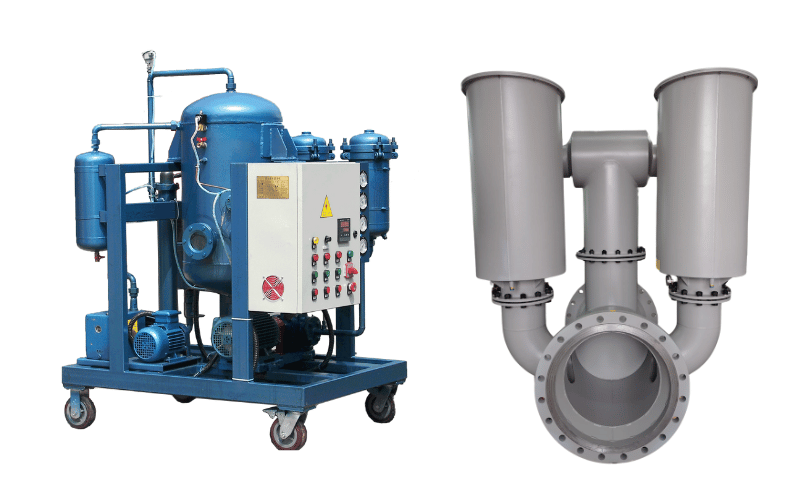
Cold Filtration
Cold filtration is a specialized method designed to remove suspended particles that precipitate at low temperatures. By cooling the liquid before filtration, this technique ensures clarity and stability in temperature-sensitive products. The liquid is cooled to a specific temperature, causing impurities to solidify or precipitate, and is then passed through a filter medium to remove these particles. This method is particularly useful in the beverage industry, where it removes haze-forming particles from beer, resulting in a clear and visually appealing product. Cold filtration is also used in the production of oils and chemicals to prevent crystallization during storage. While it is highly effective for temperature-sensitive applications, it requires precise temperature control and may not be suitable for high-volume operations due to the additional cooling step.
Hot Filtration
Hot filtration is a method used to purify solutions at high temperatures, particularly in applications involving crystalline compounds. The solution is heated to dissolve the desired compound, and impurities are filtered out while the solution remains hot. The filtrate is then cooled to allow the compound to recrystallize in a purified form. Hot filtration is commonly used in chemical synthesis to purify compounds before recrystallization. It is also employed in pharmaceutical manufacturing to remove insoluble impurities from drug formulations. This method ensures high purity and prevents premature crystallization during filtration, but it requires careful temperature control and is limited to specific applications involving heat-stable compounds.
Multi-Layer Filtration
Multi-layer filtration is a versatile method that uses tanks filled with layers of different materials, such as gravel, sand, and activated carbon, to filter out contaminants. As the liquid flows through the layers, larger particles are trapped in the upper layers, while finer particles are captured in the lower layers. This multi-stage process ensures thorough filtration and is widely used in municipal water treatment plants to remove sediment, organic matter, and other impurities, producing clean drinking water. It is also employed in industrial cooling systems to prevent scaling and fouling. Multi-layer filtration is highly effective for complex contaminants and suitable for high-volume applications, but it is primarily limited to liquid filtration and not suitable for gases or fine particle separation.
Surface Filtration
Surface filtration involves using a filter medium that acts as a barrier to trap particles on its surface. The filter medium has a uniform pore size that blocks particles larger than the pores, trapping them on the surface while allowing smaller particles to pass through. This method is commonly used in water filtration systems and industrial processes requiring the removal of larger particles. Surface filtration is employed in HVAC systems to trap dust and debris, improving air quality in industrial and commercial spaces. It is also used in pre-filtration stages for water treatment to remove larger impurities before finer filtration. While surface filtration is simple and cost-effective, it has limited capacity for fine particles and requires frequent cleaning or replacement.
Depth Filtration
Depth filtration uses a filter medium with a graded density structure to capture particles of varying sizes throughout its layers. The filter medium consists of multiple layers with varying pore sizes, allowing it to capture particles of different sizes as the fluid flows through. This ensures high-capacity filtration and thorough contaminant removal. Depth filtration is widely used in the oil and gas industry to remove fine particles from hydraulic fluids, protecting sensitive equipment and ensuring operational efficiency. It is also employed in food and beverage production to ensure product clarity and quality. Depth filtration is highly effective for fine particles and high-contaminant environments, but it has a higher initial cost compared to surface filtration and may require specialized equipment.
By understanding these additional filtration methods, industries can select the most suitable system for their specific needs. Whether it’s ensuring product clarity in beverages, maintaining sterility in pharmaceuticals, or protecting equipment in oil and gas operations, these techniques play a critical role in modern industrial processes.
Comparison of Filtration Methods
| Filtration Method | Principle | Applications | Advantages | Limitations |
|---|---|---|---|---|
| Mechanical Filtration | Uses physical barriers (e.g., screens, meshes) to trap solid particles. | HVAC systems, wastewater treatment, industrial air filtration. | Cost-effective, easy to maintain, ideal for removing larger particles. | Limited to larger particles; not effective for molecular-level impurities. |
| Adsorption | Uses materials like activated carbon to attract and trap dissolved chemicals or gases. | Air purifiers, water treatment, chemical processing. | Highly effective for removing molecular-level impurities, odors, and harmful gases. | Requires regular replacement of adsorption media; not suitable for large solid particles. |
| Centrifugal Separation | Uses spinning force to separate particles based on density. | Dairy processing, oil refining, chemical production. | Efficient for high-volume processes, reduces disposable filter use, environmentally friendly. | Limited to density-based separation; requires specialized equipment. |
| Membrane Filtration | Uses semi-permeable membranes to separate particles, microorganisms, and dissolved substances. | Water desalination, pharmaceutical manufacturing, beverage production. | Highly precise, versatile, and capable of achieving ultra-pure results. | High initial cost; membranes require regular cleaning or replacement. |
| Gravity Filtration | Relies on gravity to push liquids through a filter medium. | Laboratory experiments, small-scale water purification. | Simple, cost-effective, and energy-efficient. | Not suitable for high-volume or fine-particle filtration. |
| Vacuum Filtration | Uses negative pressure to accelerate filtration. | Pharmaceutical manufacturing, air purification in cleanrooms. | Faster and more precise than gravity filtration; effective for fine particles. | Requires specialized equipment; less cost-effective for low-volume operations. |
| Cold Filtration | Cools liquids to precipitate impurities before filtration. | Beverage industry (e.g., beer), oil and chemical production. | Ideal for temperature-sensitive applications; prevents haze formation. | Requires precise temperature control; not suitable for high-volume operations. |
| Hot Filtration | Filters solutions at high temperatures to remove impurities. | Chemical synthesis, pharmaceutical manufacturing. | Ensures high purity for crystalline compounds; prevents premature crystallization. | Limited to heat-stable compounds; requires careful temperature control. |
| Multi-Layer Filtration | Uses layers of materials (e.g., gravel, sand) to filter contaminants. | Municipal water treatment, industrial cooling systems. | Highly effective for complex contaminants; suitable for high-volume applications. | Primarily limited to liquid filtration; not effective for gases or fine particles. |
| Surface Filtration | Traps particles on the surface of a filter medium. | HVAC systems, pre-filtration in water treatment. | Simple, cost-effective, and widely applicable for larger particles. | Limited capacity for fine particles; requires frequent cleaning or replacement. |
| Depth Filtration | Uses a graded density structure to capture particles of varying sizes. | Oil and gas industry, food and beverage production. | High capacity, effective for fine particles, suitable for high-contaminant environments. | Higher initial cost; may require specialized equipment. |
By understanding the principles and applications of each filtration method, industries can select the most suitable system to meet their specific needs. Whether it’s removing sediment in water treatment, capturing VOCs in air purification, or achieving ultra-pure water for pharmaceuticals, these methods ensure efficiency, safety, and compliance across a wide range of applications.
Common Contaminants Removed
Industrial filtration systems are designed to address a wide variety of contaminants, ensuring the safety and efficiency of processes. These include:
- Dust and Dirt Particles: Common in HVAC systems and manufacturing facilities, where air quality is critical.
- Rust and Scale: Found in pipelines and water systems, particularly in industries like oil and gas or municipal water treatment.
- Microbes and Bacteria: A major concern in food, beverage, and pharmaceutical production, where sterility is essential.
- Chemical Impurities: Such as chlorine, heavy metals, or VOCs, often removed in water treatment and chemical processing.
- Oil and Grease Residues: Found in machinery and automotive applications, where clean lubricants are necessary for performance.
- Process Debris: Generated during manufacturing, such as metal shavings or plastic particles, which can damage equipment or compromise product quality.
By tailoring filtration systems to specific contaminants and applications, industries can maintain operational efficiency, protect equipment, and ensure compliance with safety and quality standards.
The Critical Importance of Industrial Filtration
Industrial filtration is essential for maintaining operational efficiency, ensuring product quality, and meeting safety and environmental standards. By removing contaminants, filtration systems protect expensive equipment, improve workplace conditions, and help industries comply with strict regulations. From power plants to pharmaceutical manufacturing, filtration is a cornerstone of modern industrial processes.
Protecting Valuable Equipment
Dirt, grit, and other abrasive particles can cause severe damage to machinery, leading to costly repairs and downtime. For example, in power plants, filters prevent particles from damaging turbines, which can cost millions of dollars to repair or replace. Similarly, in automotive manufacturing, hydraulic systems rely on clean lubricants to avoid wear caused by metal shavings or debris.
Industrial filters act as a barrier, preventing these contaminants from reaching critical components. This protection extends the lifespan of expensive equipment like pumps, turbines, and engines. Studies show that poor filtration can increase maintenance costs by up to 30% and lead to unplanned downtime, which can cost manufacturers thousands of dollars per hour.
Ensuring Product Quality
Contaminants can compromise the quality of finished products, leading to defects, safety concerns, and damage to brand reputation. In the food and beverage industry, for instance, bacteria or sediment in liquids like milk or juice can spoil products and pose health risks to consumers. Filtration systems remove these impurities, ensuring products meet safety and quality standards.
In electronics manufacturing, even a microscopic particle of dust can cause short circuits or defects in microchips. Cleanroom environments rely on HEPA filters to remove particles as small as 0.3 microns, ensuring the production of flawless components. Pharmaceutical companies also depend on sterile filtration to prevent microbial contamination in medicines, meeting stringent FDA and GMP (Good Manufacturing Practice) requirements.
Improving Workplace Safety
Industrial processes often generate harmful dust, fumes, or airborne toxins that can pose serious health risks to workers. For example, welding operations release metal fumes that can cause respiratory illnesses, while chemical plants emit volatile organic compounds (VOCs) that are hazardous when inhaled.
Filtration systems clean the air, ensuring a safer work environment. In mining operations, for instance, dust suppression systems capture silica particles, reducing the risk of lung diseases like silicosis. According to OSHA, effective air filtration can reduce workplace illnesses by up to 50%, highlighting its critical role in worker safety. As one safety engineer notes, “Air filtration is not just a compliance measure—it’s a life-saving necessity.”
Environmental Compliance
Many industries are required to treat wastewater and other byproducts before releasing them into the environment. Filtration systems remove pollutants such as heavy metals, oil residues, and chemical contaminants, ensuring compliance with environmental regulations, including the Clean Water Act in the U.S. and the EU Water Framework Directive.
For example, a chemical plant implemented advanced membrane filtration, reducing heavy metal discharge by 95%. This solution met regulatory standards and avoided $500,000 in annual fines. Similarly, oil refineries use filtration systems to remove hydrocarbons from wastewater, protecting local ecosystems and avoiding reputational damage. Non-compliance with environmental standards can result in hefty fines, legal action, and loss of operating licenses, making filtration a critical investment for sustainable operations.
By tailoring filtration systems to meet specific industrial needs, companies can effectively protect their equipment, ensure product quality, safeguard workers, and fulfill their environmental obligations.
Filtration in Different Industries
Filtration is a cornerstone of many industries, ensuring product quality, operational efficiency, and compliance with safety and environmental standards. Each sector employs specialized filtration methods tailored to its unique challenges, from maintaining sterility in the pharmaceutical industry to protecting critical equipment in power plants.
Food and Beverage
In the food and beverage industry, filtration is essential for maintaining product quality, safety, and consistency. For example:
- Milk Production: Microfiltration removes bacteria and spores while retaining essential nutrients, ensuring milk meets safety standards.
- Juice Processing: Filters remove pulp and sediment, creating a clear, visually appealing product.
- Beer Brewing: Diatomaceous earth filters are used to remove yeast and other particles, ensuring clarity and a smooth finish.
Sterile filtration is particularly critical for packaged goods, such as bottled water or canned beverages, as it eliminates bacteria and microorganisms that could compromise shelf life or consumer safety. Compliance with regulations like FDA and HACCP standards ensures these products meet strict quality requirements.
Pharmaceuticals
Pharmaceutical manufacturing demands the highest levels of purity, making advanced filtration systems indispensable. Specific applications include:
- Water for Injection (WFI): Reverse osmosis and ultrafiltration systems produce ultra-pure water free from bacteria, endotoxins, and dissolved solids, which is critical for drug formulation and sterile injections.
- Cleanroom Air Filtration: HEPA filters remove 99.97% of airborne particles as small as 0.3 microns, ensuring compliance with ISO 14644 cleanroom standards and preventing contamination during the production of sensitive medications and vaccines.
Filtration systems also play a key role in removing impurities from raw materials and ensuring sterility in final products, meeting stringent regulatory requirements such as GMP (Good Manufacturing Practice) guidelines.
Manufacturing and Automotive
In manufacturing and automotive industries, filtration systems are vital for protecting machinery, improving product quality, and maintaining operational efficiency. Examples include:
- CNC Machining: Filtration systems remove metal shavings and debris from cutting fluids, extending tool life and improving machining precision.
- Hydraulic Systems: Filters in hydraulic machinery prevent contaminants from causing wear or damage to complex components, reducing maintenance costs and downtime.
- Automotive Paint Shops: Air filtration systems prevent dust and particles from settling on car surfaces during painting, ensuring a flawless finish and reducing rework.
Proper filtration in these industries not only enhances efficiency but also reduces waste and operational costs, making it a critical investment.
Power Generation
Power generation facilities rely heavily on filtration to protect critical equipment and maintain efficiency. Specific applications include:
- Turbine Protection: Gas turbines use advanced air filtration systems to remove fine particles from intake air, preventing erosion of turbine blades and extending their lifespan.
- Engine Oils: Filtration systems ensure turbine and engine oils remain free from contaminants, safeguarding high-speed, sensitive components from damage.
- Cooling Water Systems: In nuclear and thermal power plants, cooling water is filtered to prevent biofouling and scaling, ensuring consistent heat exchange and operational safety.
Poor filtration in power generation can lead to reduced efficiency, increased maintenance costs, and even unplanned outages, making it a critical component of reliable energy production.
By tailoring filtration systems to the specific needs of each industry, companies can ensure product quality, protect equipment, and meet regulatory standards, all while improving operational efficiency.
Choosing the Right Filtration System
Selecting the right filtration system is critical for achieving optimal performance, protecting equipment, and meeting specific operational requirements. Each industry and application has unique needs, so making an informed decision requires evaluating your requirements, understanding key factors, and seeking expert guidance.
Understanding Your Needs
Before choosing a filtration system, it’s essential to identify your specific requirements. Consider these critical questions, along with real-world examples:
- What contaminants are you trying to remove?
For instance, sediment and rust in municipal water treatment, bacteria in pharmaceutical production, or oil residues in automotive manufacturing. Knowing the type of contaminant helps determine the appropriate filtration method, such as mechanical filtration for solids or adsorption for chemical impurities. - What is the flow rate of the liquid or gas being filtered?
High-flow systems, like those in municipal water plants, require robust filters that can handle large volumes without clogging. In contrast, low-flow systems, such as laboratory filtration setups, prioritize precision over capacity. - What are the operating temperature and pressure conditions?
Filters in power plants must withstand high temperatures and pressures, while those in food and beverage production may need to operate at lower temperatures to preserve product quality. - What level of purity or cleanliness is required?
Applications like semiconductor manufacturing demand ultra-pure water with minimal dissolved solids, while general HVAC systems may only require basic air filtration to remove dust and allergens.
Key Factors to Consider
When evaluating filtration systems, it is crucial to consider several key factors to ensure the optimal fit for your specific application. These factors directly influence the system’s performance, durability, and cost-effectiveness, making them critical for achieving optimal results in various industries.
Filter Media
The choice of filter media is crucial as it determines the durability, efficiency, and suitability of the filtration system for specific applications. Different materials are designed to handle unique challenges:
- Ceramic Filters: These are ideal for high-temperature environments, such as gas filtration in power plants, where heat resistance is critical. However, they may not be suitable for applications requiring flexibility or lightweight materials.
- Activated Carbon: Widely used in water treatment and air purification, activated carbon effectively removes chlorine, organic compounds, and odors. For example, it is commonly used in municipal water treatment plants to enhance water quality and improve taste and safety. However, activated carbon requires regular replacement to maintain its effectiveness.
- Stainless Steel Mesh: Known for its durability, stainless steel mesh is often employed in industrial oil filtration to handle abrasive contaminants like metal shavings. It is instrumental in automotive manufacturing, where hydraulic systems rely on clean lubricants to prevent wear and tear.
Selecting the right filter media depends on the operating conditions, such as temperature, pressure, and the type of contaminants being removed.
Micron Rating
Micron rating indicates the smallest particle size a filter can trap, making it a critical factor for precision applications. The appropriate micron rating depends on the specific contaminants and the level of purity required:
- 5-Micron Filters: These are suitable for removing visible particles, such as sediment and rust, in water treatment systems. For example, they are commonly used in pre-filtration stages to protect downstream equipment.
- 0.2-Micron Filters: These are essential for sterilization in pharmaceutical production, as they effectively trap bacteria and other microorganisms. For instance, injectable drug manufacturing relies on 0.2-micron filters to meet stringent FDA and GMP (Good Manufacturing Practice) standards.
- Sub-Micron Filters: In semiconductor manufacturing, filters with ratings as low as 0.01 microns are used to produce ultra-pure water, ensuring the precision and reliability of microchip production.
Understanding the size and type of contaminants in your process is key to selecting the correct micron rating.
Efficiency
Efficiency measures how effectively a filter removes contaminants while maintaining adequate flow rates. High-efficiency filters are essential in industries with strict cleanliness requirements:
- HEPA Filters: These filters remove 99.97% of particles as small as 0.3 microns, making them indispensable in cleanrooms for pharmaceutical and electronics manufacturing. For example, HEPA filters are used in vaccine production to prevent contamination during sensitive processes.
- Oil Refinery Filters: High-efficiency filters in oil refineries prevent contaminants like sludge and water from damaging sensitive equipment, reducing maintenance costs and improving operational reliability. For instance, a refinery using high-efficiency filters reported a 20% reduction in unplanned downtime.
For applications requiring even stricter standards, ULPA filters (Ultra-Low Penetration Air) can achieve 99.999% efficiency for particles as small as 0.12 microns.
Capacity
Capacity refers to how much material a filter can hold before it needs replacement or cleaning. This factor is particularly important in continuous manufacturing processes where downtime can be costly:
- High-Capacity Filters: In chemical production, high-capacity filters reduce the frequency of maintenance, ensuring uninterrupted operations. For example, a chemical plant using high-capacity filters reported a 15% increase in production efficiency by minimizing downtime.
- Low-Capacity Filters: While suitable for short-term or low-volume applications, low-capacity filters may require frequent replacement, increasing operational costs over time.
Choosing a filter with adequate capacity ensures consistent performance and reduces the risk of process interruptions.
Cost
Cost considerations include both the initial purchase price and ongoing maintenance expenses. Balancing upfront investment with long-term value is essential:
- HEPA Filters: While HEPA filters have a higher upfront cost, they require less frequent replacement in cleanroom environments, making them cost-effective for industries like pharmaceuticals and electronics.
- Disposable Filters: These are more affordable for short-term use, such as in temporary construction projects or seasonal operations. However, they may not be suitable for high-volume or long-term applications due to frequent replacement needs.
- Reusable Filters: In industries like food and beverage, reusable filters offer better long-term value by reducing waste and replacement costs. For example, breweries often use reusable diatomaceous earth filters to maintain clarity in beer production.
When evaluating cost, it’s important to consider the total cost of ownership, including maintenance, replacement, and potential downtime.
By carefully evaluating these factors—filter media, micron rating, efficiency, capacity, and cost—you can select a filtration system that meets your operational needs while ensuring efficiency, reliability, and cost-effectiveness. Tailoring your choice to the specific requirements of your industry and application will help optimize performance and minimize long-term expenses.
Seeking Expert Advice
Filtration is a complex process, and getting it right the first time can save time, money, and resources. Consulting with filtration experts ensures you choose a system tailored to your specific needs. Experts can:
- Conduct site assessments to analyze flow rates, contaminant levels, and operating conditions.
- Recommend custom solutions, such as multi-stage filtration systems for complex applications like oil refineries or pharmaceutical cleanrooms.
- Help you navigate compliance requirements, such as FDA regulations for food and beverage production or environmental standards for wastewater treatment.
For example, a manufacturing plant struggling with frequent equipment failures due to contaminated hydraulic fluids consulted a filtration expert. By implementing a high-efficiency filtration system, they reduced maintenance costs by 25% and extended equipment lifespan by 30%.
By carefully evaluating your needs, considering key factors, and seeking professional guidance, you can select a filtration system that meets your operational goals while ensuring efficiency, compliance, and cost-effectiveness.
The Future of Industrial Filtration
Industrial filtration is transforming, driven by advancements in technology and materials. These innovations aim to enhance efficiency, lower costs, and meet the increasing demands of industries such as pharmaceuticals, water treatment, power generation, and manufacturing. By integrating smart technologies and advanced materials, filtration systems are becoming more precise, reliable, and sustainable.
Smarter Filtration Technologies
The integration of smart technologies is revolutionizing filtration systems, making them more efficient and adaptable to the complex needs of industrial applications. Key advancements include:
- Self-Cleaning Filters:
These filters are gaining traction in industries like water treatment and chemical processing, where high sediment loads or contaminants can quickly clog traditional filters. For example, self-cleaning filters in municipal water treatment plants automatically remove trapped particles, reducing downtime and eliminating the need for frequent manual cleaning. This not only improves operational efficiency but also extends the lifespan of the filtration system. - Real-Time Monitoring:
Sensors embedded in filtration systems are enabling real-time tracking of performance metrics such as flow rate, pressure, and contaminant levels. In oil and gas pipelines, for instance, these sensors detect blockages or pressure drops, allowing operators to address issues before they escalate. This technology ensures uninterrupted operations and reduces the risk of costly failures. - Predictive Maintenance:
Predictive maintenance takes real-time monitoring a step further by analyzing data to forecast potential failures. For example, a manufacturing plant using predictive maintenance software reduced unplanned downtime by 30% by identifying filter clogs and wear patterns before they caused system disruptions. This proactive approach minimizes maintenance costs and improves overall system reliability.
Advanced Materials
The development of advanced materials is pushing the boundaries of what filtration systems can achieve, enabling higher efficiency and more precise contaminant removal. Key innovations include:
- Next-Generation Membranes:
New membrane technologies are being designed to capture even the smallest particles while maintaining a longer operational life. For example, reverse osmosis membranes with enhanced durability are being used in desalination plants to produce clean drinking water more efficiently, reducing energy consumption and operational costs. - Nanomaterials:
Materials like graphene and carbon nanotubes are being explored for their exceptional filtration properties. Graphene-based membranes, for instance, are being tested in water purification systems to remove salts and contaminants at a molecular level, making them ideal for desalination and wastewater treatment. Similarly, carbon nanotubes are being incorporated into air filtration systems to capture ultrafine particles, which is critical for cleanroom environments in semiconductor and pharmaceutical manufacturing. - Hybrid Materials:
Hybrid materials that combine traditional and advanced components are emerging as a solution for complex filtration needs. For example, ceramic-polymer composites are being used in high-temperature applications, such as gas filtration in power plants, where traditional materials would degrade.
Industry Impact
These advancements are not just theoretical—they are already being implemented across various industries. For example:
- In the pharmaceutical sector, advanced HEPA filters and nanomaterial-based membranes are ensuring sterility in vaccine production.
- In power generation, self-cleaning filters and high-efficiency membranes are protecting turbines and improving cooling water quality.
- In food and beverage, smart filtration systems are maintaining product quality by removing bacteria and sediment while reducing operational costs.
By adopting smarter technologies and advanced materials, industries can achieve greater efficiency, reduce environmental impact, and meet increasingly stringent regulatory standards. The future of industrial filtration is not just about removing contaminants—it’s about creating systems that are smarter, more sustainable, and tailored to the evolving needs of modern industries.
Frequently Asked Questions
Q: What is industrial filtration?
A: Industrial filtration removes contaminants from air, water, and other fluids used in industrial operations. This process ensures equipment runs efficiently, maintains product quality, and protects the work environment from harmful pollutants.
Q: What are the different types of industrial filtration systems?
A: Industrial filtration systems include mechanical filtration, electrostatic filtration, membrane filters, and depth filters. Each system targets specific contaminants in air or liquids, ensuring optimal performance for various industrial applications.
Q: How do industrial filters help in air quality management?
A: Industrial filters remove contaminants from air and gas streams, improving air quality. These systems reduce pollutants, create healthier work environments, and help industries comply with environmental regulations.
Q: What is the purpose of filtration in industrial applications?
A: Filtration in industrial applications protects equipment, enhances product quality, and ensures employee safety. By removing solid particles, gases, and other contaminants, filtration systems improve operational efficiency and reliability.
Q: What is the role of filter media in industrial filtration?
A: Filter media are critical components of filtration systems, designed to capture contaminants from air or liquid streams. Options like activated carbon and cartridge filters are chosen based on the type of contaminants and the specific filtration requirements.
Q: How do filtration systems assist in water treatment?
A: Filtration systems remove solid particles, contaminants, and impurities from water, ensuring it meets safety standards for industrial use. These systems protect machinery, improve product quality, and support sustainable operations.
Q: Why is it important to choose the right industrial filtration system?
A: Choosing the right industrial filtration system ensures efficient operations, high product quality, and extended equipment lifespan. The right system effectively removes specific contaminants while minimizing operational costs.
Q: What are the benefits of using advanced filtration technologies?
A: Advanced filtration technologies, such as electrostatic and membrane filtration, offer superior contaminant removal. These systems improve equipment protection, enhance air and water quality, and increase overall operational efficiency.
Q: How do industrial air filtration systems work?
A: Industrial air filtration systems use various filters to capture particulates and gaseous pollutants from air streams. These systems maintain clean air in facilities, safeguard worker health, and protect machinery from damage.
Concluding Summary
Industrial filtration is more than a technical process—it’s a critical enabler of operational success, product quality, and environmental compliance. By understanding the fundamentals, tailoring systems to specific needs, and embracing advancements like smart technologies and nanomaterials, businesses can optimize efficiency, reduce costs, and meet the demands of modern industries. Whether it’s protecting turbines in power plants, ensuring sterility in pharmaceuticals, or improving air quality in manufacturing, filtration systems are evolving to meet the challenges of today and tomorrow. Investing in the right filtration solutions is not just a necessity—it’s a strategic advantage.


